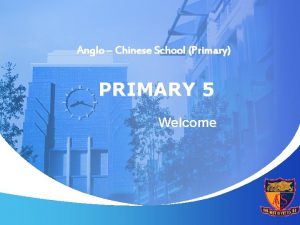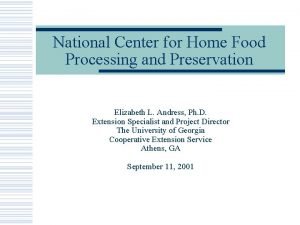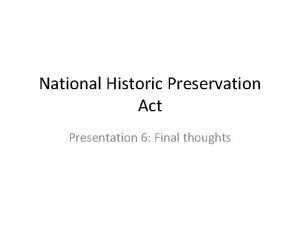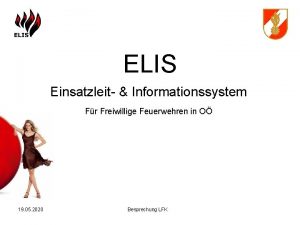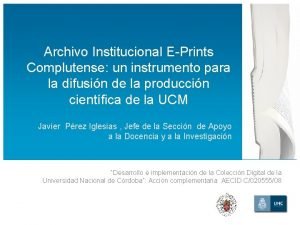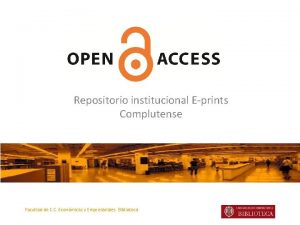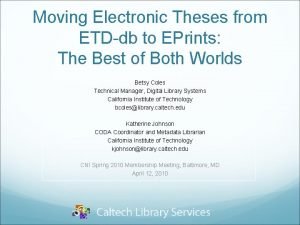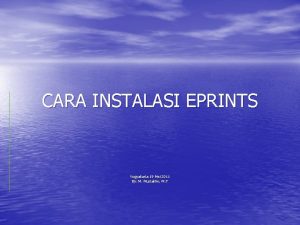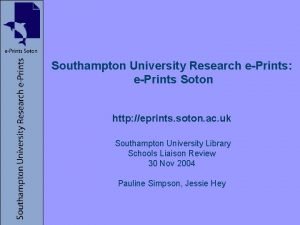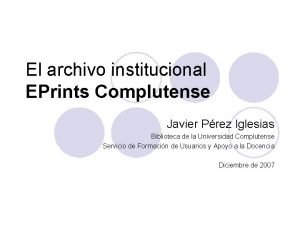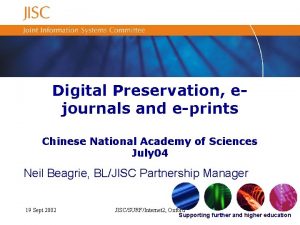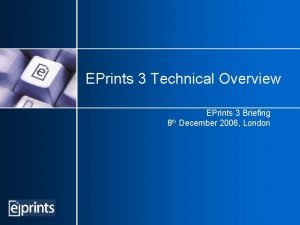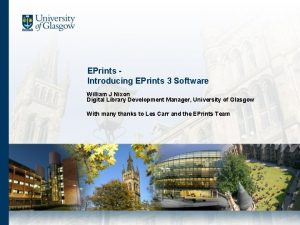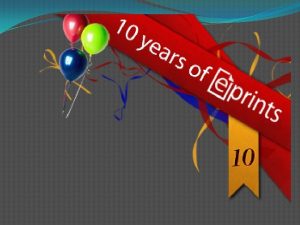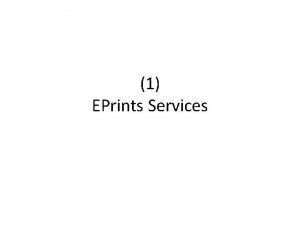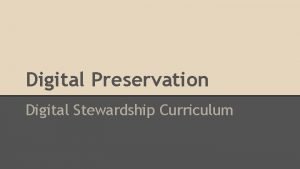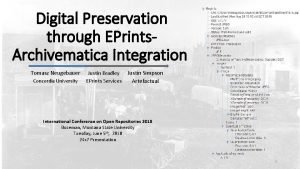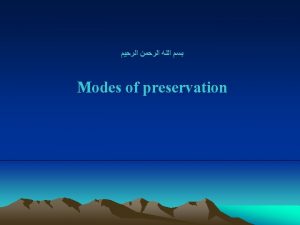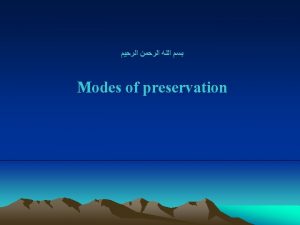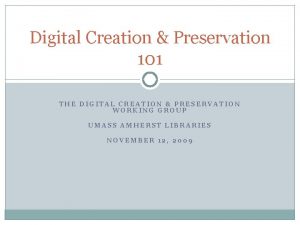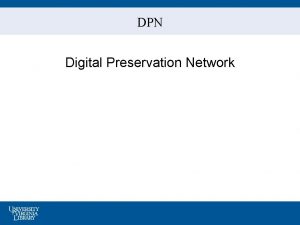Digital Preservation ejournals and eprints Chinese National Academy



















- Slides: 19

Digital Preservation, ejournals and e-prints Chinese National Academy of Sciences July 04 Neil Beagrie, BL/JISC Partnership Manager 19 Sept 2002 JISC/SURF/Internet 2, Oxford Supporting further and higher education

Overview • Digital Challenges • JISC archiving e-journals study • JISC preservation of e-prints study • Sources of advice • Questions? 2

New digital challenges • Media Degradation - media degrades and information is easily destroyed without adequate care • Technological Obsolescence- only accessible through hardware and software rapid obsolescence eg BBC Domesday • Authenticity - electronic records easily amended and have to be moved through new technologies • Licensing access to content and implications for future preservation and access 3

Predicted Growth of Serials Publications (after EPS) All serials (print + e-) Dual form e-only serials 4

Archiving E- Publications JISC study by Maggie Jones available from: <http: // www. jisc. ac. uk/ index. cfm? name= project_epub_ archiving> • Final report • digest of reading • report of libraries survey • report of Archiving Workshop 5

Background • PSLI 1996 - 1998 – site licences with 4 publishers - focus on print • NESLI 1999 - 2002 – Encouraged a move by libraries towards electronic access – Encouraged publishers to permit print cancellations • Study commissioned as part of implementation of JISC Continuing Access and Digital Preservation Strategy 6

Issues • Few journals are solely in digital form at this stage but parallel print/ e- access can only be regarded either as interim or partial equivalents • What guarantees do libraries have when they licence access to digital material they don’t own (and it is served from outside national boundaries)? • Concerns about continued access following termination of a licence are a major inhibiting factor for libraries wishing to move to e- only access 8

NESLI Model Licence • Developed collaboratively between publishers and libraries • Since 1999 has included clauses relating to continued access to material already paid for following termination of licence • Assumes the licence cost includes “perpetual access” 9

NESLI Archiving Clauses • Clause 2. 2. 2 provides three options: – Following termination of licence, continued access to be delivered: – online from publishers server or third party – archival copy delivered to Licensee – archival copy delivered to a central archiving facility operated on behalf of HE 10

Archiving by publishers • Short-medium term option Business model doesn’t include preservation for common good • Publishers don’t necessarily hold all archival rights • Vary greatly in size, business model, strategic directions • Libraries have concerns about publishers taking on this role 11

Archiving by the Library • The “archival copy” referred to in the licence tends to be CD- ROM • Libraries do not want to undertake this role • Random distribution of effort • There is a strong sense of wanting to find a national solution offering a reliable service 12

Central Archiving Facility • Doesn’t currently exist and will be expensive to establish • A central service which would provide libraries with the assurance they need without undermining publishers business models – What should it look like? – How would it operate? – How would it be funded? 13

Archiving Workshop • 26 invited delegates attended a Workshop on 17 th February 2003 • Considered organisational options; related developments; legal issues; business models • Assumed that the status quo needs to be improved • Needed to decide on plan of action to move things forward 14

Models outside UK • Outcomes of Mellon projects – New organisations will be necessary to act in the broad interests of the scholarly community and mediate the interest of libraries and publishers –JSTOR e-archiving pilot • LOCKSS consortium (JISC currently assessing LOCKSS) • national library acting as official archive for publisher (KB/ Elsevier agreement) • OCLC Digital Archive 15

UK Legal Deposit • Enabling legislation has been passed. Regulations need to be drafted to enact for specific categories of material • Substantial achievement (1 of only 7 worldwide) • Major infrastructure (DOMS) being developed at BL for these and other digital materials • However – significant number of e-journals used by UK HE will be sourced internationally and outside UK jurisdiction – Full solution to E-journal archiving challenges will need to be wider than UK – Access needs/rights of purchasers in universities and legal deposit public access rights are different 16

Workshop conclusions • Any solution must be an active collaboration between libraries and publishers (and possibly wider than this eg learned societies) • Publishers’ servers are probably the best means of access in the short- medium term • The option of providing an archival copy to individual libraries is not recommended • Unlikely to be a single point solution - central co-ordination needs to be established to evaluate and ensure ongoing access • JISC will seek to implement and move forward study recommendations (series of collaborations may be involved in this) 17

Preservation of E- Prints • JISC funding development of institutional repositories for e-prints, etheses etc under its FAIR programme (more later). • JISC preservation feasibility study by Hamish James et al-Final report available from: <http: //www. jisc. ac. uk/uploaded_documents/eprints_report_final. pdf> • JISC funding call 04/04 to implement main recommendations 19

04/04 Supporting Institutional Digital Preservation and Asset Management • Theme one: Institutional Management Support and Collaboration (policy, procedures, roles, training) • Theme two: Digital Preservation Assessment Tools • Theme three: Institutional Repository Infrastructure Development (replication, file format conversion, preservation network) • Closing date 21 July 20

Further Advice and Guidance • Preservation Management of Digital Materials • price £ 15 • order from: – Turpin Distribution Services Ltd Email turpin@turpinltd. com • electronic edition by Digital Preservation Coalition – www. dpconline. org • Digital preservation list – http: //www. jiscmail. ac. uk/lists/digitalpreservation 19 Sept 2002 JISC/SURF/Internet 2, Oxford 21
 Anglo chinese school chinese name
Anglo chinese school chinese name Illinois digital preservation
Illinois digital preservation National center for home food preservation
National center for home food preservation National center for home food preservation
National center for home food preservation National center for genetic resources preservation
National center for genetic resources preservation National historic preservation act
National historic preservation act Um repository
Um repository Eprints southampton
Eprints southampton Lfk einsätze
Lfk einsätze Eprints complutense
Eprints complutense Eprints complutense
Eprints complutense Etddb
Etddb Install eprints
Install eprints Eprints soton
Eprints soton Eprints soton
Eprints soton Eprints complutense
Eprints complutense What is chinas national animal
What is chinas national animal Chinese national curriculum core subjects
Chinese national curriculum core subjects What is nsfc
What is nsfc Kyrene digital academy calendar
Kyrene digital academy calendar
